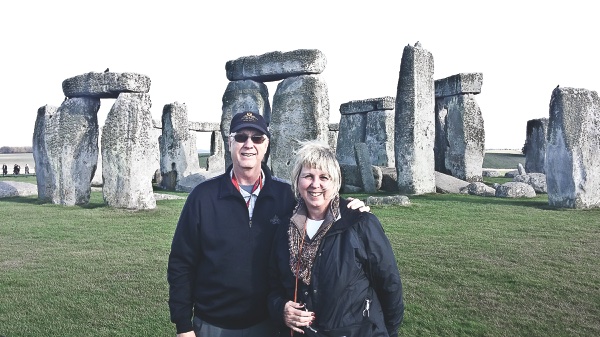When you hear someone says “United Kingdom” or “UK” what do you think it means? Most people think the phrase is only limited to England, but that’s not true. It also includes Northern Ireland, Scotland, and Wales. The UK almost lost Scotland recently, but the populous voted to retain the status quo.
Linda and Grant Jahr (neighborhood 24) toured three of the Kingdoms on their latest trip. Next quiz: which of these would you think has the most castles? England – no, Scotland – no, Wales – yes, and they were able to visit a number of them.They had signed up for a 12-day tour, but decided to spend more time in London, so they arrived a few days early allowing them to reset their internal clocks. After landing at Heathrow, the tube (subway) proved the easiest way to get to their hotel near St. James’s Park Station.

The Jahrs in front of Stonehenge. (Photos provided)
About halfway between Buckingham Palace and Westminster, it was the perfect location from which to base their exploration of London. Taking the pure tourist route, they visited Buckingham Palace for the changing of the guard ceremony, Westminster Abbey, Parliament, and Big Ben. Using the Big Red Double-decker bus for day two with “on and off” privileges (one of my favorite form of transportation in any city), they visited the Tower of London where the crown jewels are on display and were guided by a real “Beefeater” (military retiree). To their surprise, they were also able to witness the UK commemorating the end of World War I. The Tower moat was filled with 888,246 red ceramic poppies. Each poppy represent a UK soldier lost in the war and will eventually be sold for military charities. The day ended with a visit to 10 Downing Street, Trafalgar Square, and Hyde Park. Switching to the subway and walking for the remainder of their London visit, they took the tube to see St. Paul’s Cathedral, the National Gallery in Trafalgar Square, and then to Piccadilly Circus. The following day included Kensington Gardens and Kensington Palace, Hyde Park, and Harrods’s department store. Their last day included a ride on the London Eye, Covent Garden, and Madame Tussaud’s Wax Museum, which surprisingly was a fun stop. Each day, they made it a point to eat at a local pub to gain the local experience of fish and chips, bangers and mash, or meat pies. Some were very good, and others not so much, but each was a unique experience.
Now for the official tour. After that busy week, they joined Grand Circle Tours for the rest of their trip. Their motor coach adventure included stops in Oxford to visit one of the many colleges, Stratford upon Avon, Shakespeare’s hometown, Bath, to tour the ancient Roman Baths and finally, Stonehenge. How did they move those 20-ton stones?

Next stop: Wales. First stop, the picturesque village of Llangollen then on to Caernarfon for two nights and the Prince of Wales castle. That first night proved extra special as they had dinner in the home of a Welsh family. Dating back to the 18th century, the home had been the parsonage for a church. The next day included a ride on the Ffestiniog Mountain Railway up into the high country, and lunch in Portmeiron, an old resort on the sea, with a visit to a historic slate factory afterwards.
After the stay in Wales, they went back into England. The next three nights were spent in York. Featured was “Afternoon Tea” at the famous Betty’s Tea Room (including biscuits and clotted cream). They also toured the York Minster and attended Evensong Service that evening. The following day, they motored to the North Sea coast city of Whitby where they toured the ruins of Whitby Abbey complete with a traditional lunch of fish and chips (fresh cod caught that morning). On the way back to York, they stopped and toured Castle Howard, which is really a country estate similar to Downton Abbey. Tired yet? There’s still more to see.
Leaving York, they proceeded to the Lake District in northern England and had lunch in an old farmhouse on the former estate of Beatrix Potter. The next day was Scotland, but just before crossing the border, they took a side trip to view a portion of Hadrian’s Wall. It was started in 122 AD by Roman Emperor Hadrian to separate the Scots from the Romans. Then, they went on to Edinburgh for a three-night stay to tour the city center and Edinburgh Castle. That evening, they were entertained with a Scottish Evening dinner and show with singing, dancing, bagpipes, and “The Addressing to a Haggis.” (You’ll have to research that one yourself!) The next day included a tour of the Royal Yacht Britannia, now a museum, and visiting the Palace of Holyrood, one of the Queen’s summer residences. The tour completed with a farewell dinner where they enjoyed more haggis and bagpipes.
PS: A retired member of the Queen’s Guard told the group what Scots really wear under their kilts!
Want to enjoy Haggis yourself? Think Sheep’s heart, liver, lungs, stomach casing, onion, oatmeal, suet, and spices steamed into a pudding – yummy!




